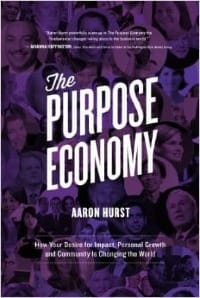New Book Review: "The Purpose Economy"
New book review for The Purpose Economy: How Your Desire for Impact, Personal Growth and Community is Changing the World, by Aaron Hurst, Elevate, 2014:


Copy provided by author Aaron Hurst via his publicist Puja Sangar.
The author believes that we as a society are in the early days of what he calls the "Purpose Economy", a fourth economic stage preceded by the Information Economy (a term coined in a doctoral thesis by his uncle, Marc Porat, almost 40 years ago), the Industrial Economy, and the Agrarian Economy. This new economy is centered on the needs of people to find purpose in their work and lives, a natural progression of the needs of people and the types of goods, services, and jobs desired by them. While the Information Economy still dominates, with technology largely synonymous with jobs, growth, and innovation, as Hurst began sharing his ideas with those around him, the ideas surrounding this new economic stage resonated with much of what they have been witnessing in their own lives.
As founder of Taproot Foundation, the largest nonprofit consulting firm in the United States, the author witnessed the positive social impact that pro bono work provided. His search for patterns in successful social change efforts resulted in what he called the "Five Levers for Social Change" (research, policy, public perceptions, disruptive technology, and bright spots) in his 5-part series for the "Stanford Social Innovation Review" a few years ago. As Hurst visually mapped out all of the diverse approaches to advancing progress, he came to understand that the diversity of perspectives of those around him to execute actually constitute a diversity of purpose.